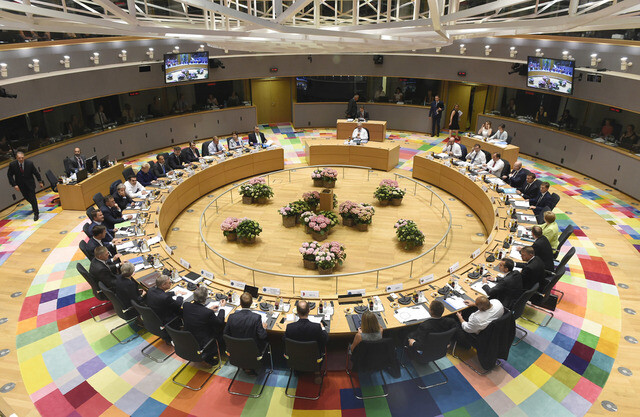hankyoreh
Links to other country sites 다른 나라 사이트 링크
South Korean government protests inclusion on EU tax haven blacklist

After the European Union (EU) included South Korea on a blacklist of tax havens on Dec. 5,the government shot back that this was as an “infringement of taxation sovereignty” and a “violation of international standards.” But some think that Seoul was complacent in its response to the EU’s plans.
“The EU’s decision does not conform to the standards of international bodies such as the OECD and is also in violation of international agreements,” said South Korea’s Ministry of Strategy and Finance in a press release on Dec. 6 responding to the country’s inclusion on the EU’s list of 17 “uncooperative regions,” which is to say tax havens.
“We proposed working with the EU to analyze the harmfulness of the programs in question and to consider improvements to those programs by mutual consent, but the EU included us on the list because we did not promise to revise or eliminate these programs by the end of 2018. For the EU to insist that a non-member state abide by EU standards constitutes a violation of taxation sovereignty,” the Ministry went on to say in the press release.
The day before, the EU’s Finance and Economy Committee, which was attended by the finance ministers of the 28 countries in the bloc, placed South Korea, along with Panama, Tunisia, Barbados and other countries, on a blacklist of “uncooperative regions” regarded as tax havens. South Korea was included on the list because of its Special Tax Treatment Control Act, which gives five to seven years of concessions on corporate and income tax for companies that set up shop in a free economic zone. The EU regards the act as a “harmful preferential tax regime,” or in other words legislation that explicitly gives tax benefits to transactions with foreigners.
Seoul contends that the EU’s measures run contrary to international standards. The OECD and the G20 have been running a program to counter base erosion and profit shifting (BEPS) strategies as part of efforts to prevent tax evasion, and in September they concluded that South Korea’s subsidies for foreign investors did not constitute a harmful preferential tax regime. Those organizations had limited the scope of tax avoidance activities to sectors with high mobility, such as finance and services.
The South Korean government is under fire, however, for having done little to address the EU’s announcement early this year that South Korea would be included on the tax haven blacklist. During negotiations with the EU, countries including Switzerland, Turkey and Hong Kong avoided inclusion on the list by promising to revise their tax systems. In the end, all the regions on the blacklist except for South Korea are either small economies or self-governing islands.
“While this does seem unfair, the truth is that South Korea is nearly the only country in the OECD that explicitly provides preferential tax treatment to foreign investors. We will take this opportunity to discuss tax concessions for foreigners in light of the interests of domestic industry and international standards,” said an official from the Ministry.
By Bang Jun-ho, staff reporter
Please direct questions or comments to [english@hani.co.kr]

Editorial・opinion
![[Column] Park Geun-hye déjà vu in Yoon Suk-yeol [Column] Park Geun-hye déjà vu in Yoon Suk-yeol](https://flexible.img.hani.co.kr/flexible/normal/500/300/imgdb/original/2024/0424/651713945113788.jpg) [Column] Park Geun-hye déjà vu in Yoon Suk-yeol
[Column] Park Geun-hye déjà vu in Yoon Suk-yeol![[Editorial] New weight of N. Korea’s nuclear threats makes dialogue all the more urgent [Editorial] New weight of N. Korea’s nuclear threats makes dialogue all the more urgent](https://flexible.img.hani.co.kr/flexible/normal/500/300/imgdb/original/2024/0424/7317139454662664.jpg) [Editorial] New weight of N. Korea’s nuclear threats makes dialogue all the more urgent
[Editorial] New weight of N. Korea’s nuclear threats makes dialogue all the more urgent- [Guest essay] The real reason Korea’s new right wants to dub Rhee a founding father
- [Column] ‘Choson’: Is it time we start referring to N. Korea in its own terms?
- [Editorial] Japan’s rewriting of history with Korea has gone too far
- [Column] The president’s questionable capacity for dialogue
- [Column] Are chaebol firms just pizza pies for families to divvy up as they please?
- [Column] Has Korea, too, crossed the Rubicon on China?
- [Correspondent’s column] In Japan’s alliance with US, echoes of its past alliances with UK
- [Editorial] Does Yoon think the Korean public is wrong?
Most viewed articles
- 1‘We must say no’: Seoul defense chief on Korean, USFK involvement in hypothetical Taiwan crisis
- 2N. Korean delegation’s trip to Iran shows how Pyongyang is leveraging ties with Moscow
- 3Amnesty notes ‘erosion’ of freedom of expression in Korea in annual human rights report
- 4‘Weddingflation’ breaks the bank for Korean couples-to-be
- 5[Reportage] On US campuses, student risk arrest as they call for divestment from Israel
- 6[Column] Park Geun-hye déjà vu in Yoon Suk-yeol
- 7Korea sees more deaths than births for 52nd consecutive month in February
- 8[Editorial] New weight of N. Korea’s nuclear threats makes dialogue all the more urgent
- 9Will NewJeans end up collateral damage in internal feud at K-pop juggernaut Hybe?
- 10[Guest essay] The real reason Korea’s new right wants to dub Rhee a founding father